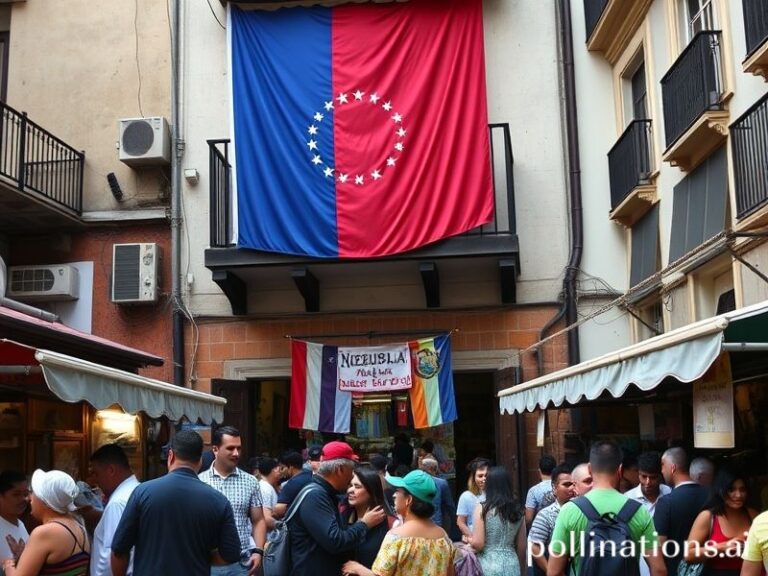Robert Herjavec’s Global Hustle: From Iron Curtain to Ionosphere, Selling Hope One Firewall at a Time
Robert Herjavec, the Croatian-Canadian who turned communist-era scarcity into capitalist fairy-tale abundance, is currently orbiting above most of us—literally. When he isn’t floating weightlessly on Jeff-Bezos-funded joyrides, he’s busy explaining to Seoul start-ups why their blockchain-powered kimchi futures platform needs “more heart” and “a better story,” which is venture-capitalist code for “please stop talking.” From Silicon Valley to the Persian Gulf, Herjavec has become the go-to motivational hologram for nations that woke up one morning and realized their entire GDP depends on convincing teenagers to download yet another app that solves the urgent crisis of not enough cat videos.
Internationally, Herjavec’s brand of bootstrap optimism lands differently depending on your postal code. In Dubai, his keynote slides—heavy on yachts and light on labor rights—are greeted like scripture by ministers who just purchased another British football club. Meanwhile, in Lagos traffic, the same slides stream on cracked phone screens held together with masking tape, where a hustling driver named Tunde mutters, “Sure, sharks invest too,” before returning his attention to the more pressing reality of fuel queues and a central bank that changes monetary policy more often than Herjavec changes Ferraris. The cognitive dissonance is not a bug; it’s the business model.
Europeans, ever the connoisseurs of irony, adore Herjavec for precisely the qualities they claim to despise in Americans: loud confidence, dental perfection, and a talent for monetizing paranoia. German regulators invite him to Berlin for “fireside chats,” then spend the Q&A politely interrogating him about data privacy, as if GDPR were a moral force rather than a 400-page permission slip for more cookies. The French just shrug: if a man wants to sell cybersecurity software by break-dancing in a sequinned shark costume, who are they to stand in the way of art?
Asia-Pacific governments watch him like a mildly dangerous exotic pet. Singapore gives him a courtesy landing visa, calculates the exact number of local millionaires who will upgrade their yacht Wi-Fi after hearing him speak, and quietly books the economic upside. Australia, never far behind in the tall-poppy-syndrome Olympics, simultaneously courts his investment and publishes op-eds asking why a guy who once sold vacuum cleaners now advises the defense department on ransomware. The answer, of course, is that vacuum cleaners and ransomware both suck—just at different ends of the supply chain.
The broader significance? Herjavec is the living embodiment of the post-ideological hustle. In a world where traditional left-right labels feel as outdated as fax machines, he offers a universal theology: pray at the altar of relentless self-improvement, tithe in venture rounds, and absolve your sins with a well-timed TEDx talk. Dictatorships like the gesture because it keeps citizens too busy optimizing their LinkedIn profiles to storm the palace. Democracies love it because it privatizes aspiration—why fund public universities when every 19-year-old can just bootstrap a SaaS company from their dorm?
And yet, beneath the motivational poster gloss, there’s a darker punchline. While Herjavec exhorts the globe to “take risks” and “fail fast,” the planet itself is failing rather slowly but irreversibly—sea levels rising like Series A valuations, carbon counts inflating faster than SPACs. The same supply chains that let him flit from Riyadh to Reykjavík in a single news cycle are the ones belching out emissions that will drown the very coastal mansions he’s selling firewalls to protect. It’s the ultimate arbitrage: monetize fear today, collect beachfront tomorrow, and let the next generation figure out how to patch the holes in both the code and the ozone.
So when you see Robert Herjavec’s smile beaming from a Jumbotron in Jakarta or Johannesburg, remember he isn’t just pitching cybersecurity or ballroom-dance redemption arcs. He’s selling the last coherent narrative we have left: that individual grit can still outrun structural collapse. It’s a comforting lie, elegantly packaged, with free global shipping. And honestly, who among us can resist next-day delivery on hope—even if the tracking number ends in 404?







